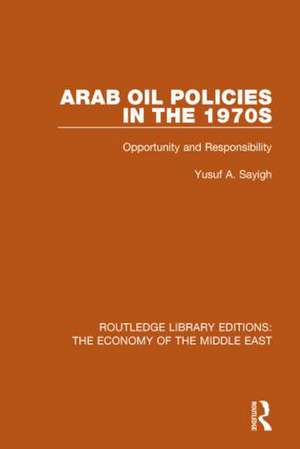Arab Oil Policies in the 1970s (RLE Economy of Middle East): Opportunity and Responsibility: Routledge Library Editions: The Economy of the Middle East
Autor Yusuf A. Sayighen Limba Engleză Paperback – 18 ian 2018
First published in 1983.
Din seria Routledge Library Editions: The Economy of the Middle East
- 16%
 Preț: 216.07 lei
Preț: 216.07 lei - 34%
 Preț: 679.09 lei
Preț: 679.09 lei - 18%
 Preț: 782.44 lei
Preț: 782.44 lei - 34%
 Preț: 995.46 lei
Preț: 995.46 lei - 17%
 Preț: 215.81 lei
Preț: 215.81 lei - 34%
 Preț: 767.47 lei
Preț: 767.47 lei - 54%
 Preț: 574.68 lei
Preț: 574.68 lei -
 Preț: 354.54 lei
Preț: 354.54 lei -
 Preț: 85.56 lei
Preț: 85.56 lei - 16%
 Preț: 216.07 lei
Preț: 216.07 lei - 16%
 Preț: 216.07 lei
Preț: 216.07 lei - 18%
 Preț: 1289.11 lei
Preț: 1289.11 lei - 34%
 Preț: 625.44 lei
Preț: 625.44 lei - 16%
 Preț: 216.07 lei
Preț: 216.07 lei - 15%
 Preț: 701.45 lei
Preț: 701.45 lei - 33%
 Preț: 9802.10 lei
Preț: 9802.10 lei - 16%
 Preț: 130.21 lei
Preț: 130.21 lei - 16%
 Preț: 216.07 lei
Preț: 216.07 lei - 16%
 Preț: 216.07 lei
Preț: 216.07 lei - 17%
 Preț: 190.88 lei
Preț: 190.88 lei - 17%
 Preț: 142.32 lei
Preț: 142.32 lei - 17%
 Preț: 142.32 lei
Preț: 142.32 lei - 16%
 Preț: 216.07 lei
Preț: 216.07 lei - 16%
 Preț: 216.07 lei
Preț: 216.07 lei - 17%
 Preț: 142.32 lei
Preț: 142.32 lei - 16%
 Preț: 216.07 lei
Preț: 216.07 lei - 33%
 Preț: 529.26 lei
Preț: 529.26 lei - 17%
 Preț: 247.40 lei
Preț: 247.40 lei
Preț: 148.43 lei
Preț vechi: 178.05 lei
-17% Nou
Puncte Express: 223
Preț estimativ în valută:
28.40€ • 29.73$ • 23.64£
28.40€ • 29.73$ • 23.64£
Carte tipărită la comandă
Livrare economică 31 martie-14 aprilie
Preluare comenzi: 021 569.72.76
Specificații
ISBN-13: 9781138820074
ISBN-10: 1138820075
Pagini: 288
Dimensiuni: 156 x 234 x 19 mm
Greutate: 0.45 kg
Ediția:1
Editura: Taylor & Francis
Colecția Routledge
Seria Routledge Library Editions: The Economy of the Middle East
Locul publicării:Oxford, United Kingdom
ISBN-10: 1138820075
Pagini: 288
Dimensiuni: 156 x 234 x 19 mm
Greutate: 0.45 kg
Ediția:1
Editura: Taylor & Francis
Colecția Routledge
Seria Routledge Library Editions: The Economy of the Middle East
Locul publicării:Oxford, United Kingdom
Cuprins
1. Identifying Major Policy Areas 2. The Policy of Control 2.1. Backdrop to the 1970s 2.2. Why Policy Control? 2.3. Why Not Earlier Policy Control? 2.4. How Was Control Achieved? 2.5. Instrumentalities of Control 3. New Policy Options in an Integrated Context 3.1. Upstream Operations: Policies and Implications 3.2. Downstream Operations: Policies and Implications 4. Oil as Engine of Development 4.1. The Financial Implications of the Policy of Control 4.2. The Developmental Impact of the Policy of Control 5. Opportunity and Responsibility 5.1. Introduction 5.2. The National and Regional Context 5.3. The International Context
Descriere
Until 1973 few people, either in the advanced, industrial countries or in the developing countries of the Third World, thought seriously on the issues and complexities involved in the production and marketing of the oil on which they relied. It was only with the sudden steep increases in oil prices that the oil industry became a matter of general discussion, and the Organisation of Petroleum Exporting Countries (OPEC) became a front page topic for analysis and comment. However, real understanding of the organisation and its policies did not accompany this rush of interest and much confusion has followed. In particular, the Arab exporters have received the weight of the criticism although they have only a share in the market and not a monopoly. This book attempts to instil a greater mutual understanding between oil exporters and importers, although it is not a wholesale endorsement of Arab policies, by outlining the major policy areas in this field. It looks at new policy options and their implications in exploration, marketing and pricing and at downstream operations such as the petrochemical and gas industries. In conclusion, this study identifies the wide-ranging opportunities that the new oil policies have opened up for the Arab countries, in the national, regional and international context, and assesses and clarifies the responsibilities which accompany this success.
